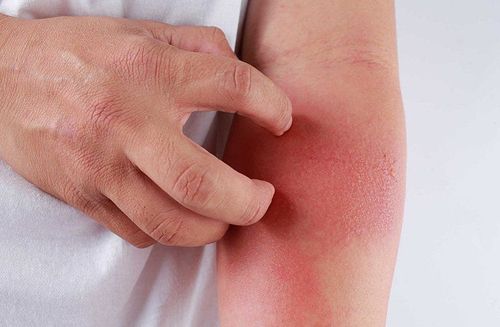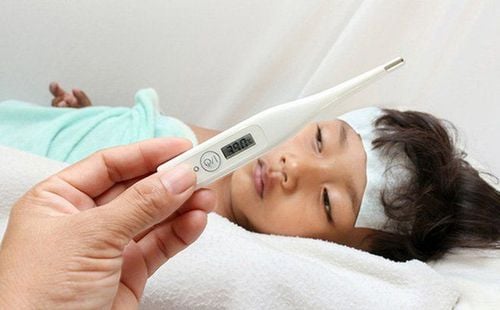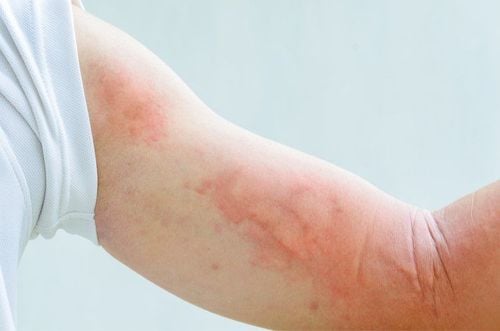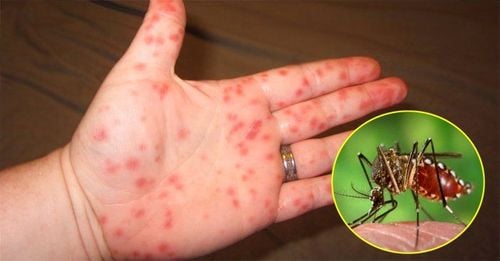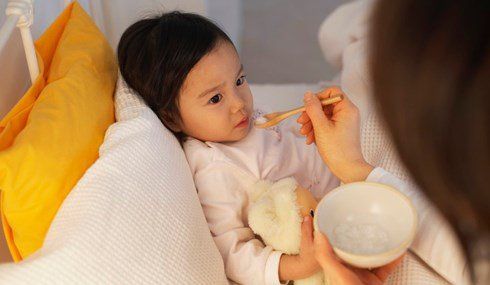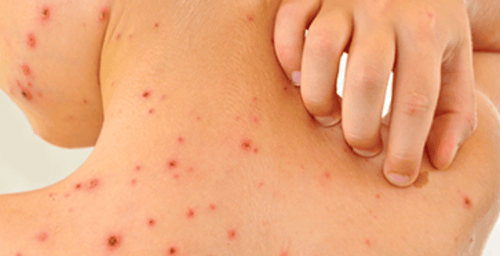This is an automatically translated article.
Dengue fever (or Dengue fever) is one of the leading causes of death in children. Therefore, parents need to know some symptoms of dengue fever in children in order to promptly detect, take the child to a doctor and get timely treatment, to avoid serious complications.1. Symptoms of dengue fever in children
Dengue fever in children has many different manifestations and complicated course. The onset of the disease is usually quite sudden and the disease progresses rapidly from mild to severe through three phases: the febrile phase, the critical phase, and the convalescent phase.1.1. Fever stage
In the early stages of dengue fever in children, the child has a sudden, continuous high fever. Young children are irritable and fussy. Older children complain of headache, loss of appetite, nausea, congestive skin manifestations (observable subcutaneous petechiae), musculoskeletal pain, pain in the eye sockets, bleeding gums or bleeding. orange.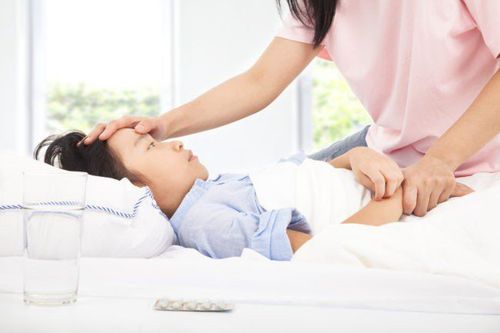
Trẻ bị sốt cao liên tục
Blood test results in the febrile stage are often not clear-cut. Specifically, the red blood cell volume (Hematocrit) is mostly normal, the platelet count is normal or gradually decreases, while the white blood cell count is often decreased.
1.2. Dangerous period
After the febrile period, the child enters the dangerous phase of the disease, which usually falls between the 3rd and 7th day after the illness. Manifestations of dengue fever in children at this stage may be still feverish or in remission, children have plasma leakage (The amount of plasma in the blood comes out massively causing the abdomen to be distended, usually lasting for 24 - 48 hours. , risk of death in pediatric dengue patients ).
Thus, when going to the doctor, it is possible to find that the child has effusion in the pleura, peritoneum, abnormally enlarged liver, edematous eyelids. If the plasma leakage is severe, it will lead to shock, with obvious manifestations such as fatigue, restlessness, lethargy, cold extremities, cold, moist skin, small rapid pulse, little urine; stuck blood pressure (maximal and diastolic blood pressure less than 20 mmHg apart), hypotension, or unmeasurable blood pressure. In particular, the child has bleeding under the skin or appears bruised patches, hemorrhagic spots are scattered or concentrated on the front of the legs and the inside of the arms, on the abdomen, thighs, ribs; mucosal bleeding, such as nosebleeds, bleeding gums, hematuria.
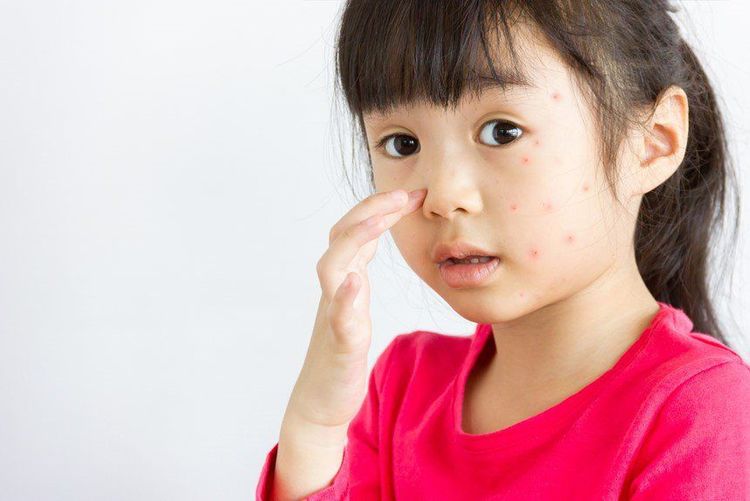
Biểu hiện xuất huyết ở trẻ em bị sốt xuất huyết
However, it should be noted that bleeding is not a mandatory manifestation of dengue fever in children, because it is possible that the child may have the disease but completely show no symptoms of hemorrhage. So, with or without symptoms of bleeding, the disease may still have reached a dangerous stage, which can cause the baby to die. One of the dangerous complications is shock, which manifests in three states of decline: decreased consciousness, hypothermia and decreased blood pressure.
At this dangerous stage, blood tests show that the platelet count drops sharply to less than 100,000 / mm3, in severe cases, the baby may have a clotting disorder, which is extremely dangerous.
1.3. Recovery phase
After the dangerous period, about 48-72 hours, is the recovery phase, the child's fever is gone, his condition is much improved, his appetite is more stable, blood pressure is more stable, and he urinates more often. When blood tests show a rapid increase in the white blood cell count, the platelet count gradually returns to normal, but usually more slowly than the white blood cell.2. Guidelines for treating dengue fever for children at home
When a child shows signs of dengue fever, it is necessary to immediately take the child to the hospital for examination and diagnosis. After that, the majority of children with dengue can be treated at home (outpatient treatment) and have full follow-up visits by appointment. It is necessary to pay attention to the instructions of the doctor for the fastest effective treatment, specifically as follows:
If the child has a high fever above 39oC, it is necessary to take paracetamol fever reducer according to the instructions for use, loosen the pants shirt, cool. Pay attention not to use aspirin or ibuprofen, because it can lead to bleeding and acidosis; Encourage your baby to drink lots of water (cooled boiled water), oresol (electrolyte water), juice (coconut water, orange, lemon, ...) or diluted porridge mixed with salt, to replenish electrolytes for the baby. ; The diet during the day should be divided into many small meals, with dilute, easily digestible and nutritionally balanced foods. Dark colored foods and drinks should not be used (to avoid confusion with gastrointestinal bleeding); Children should rest at home, limit exercise when they have dengue fever; In case the child cannot drink water due to excessive vomiting, lethargy, or lack of alertness, it should be taken to a medical facility for further instructions.
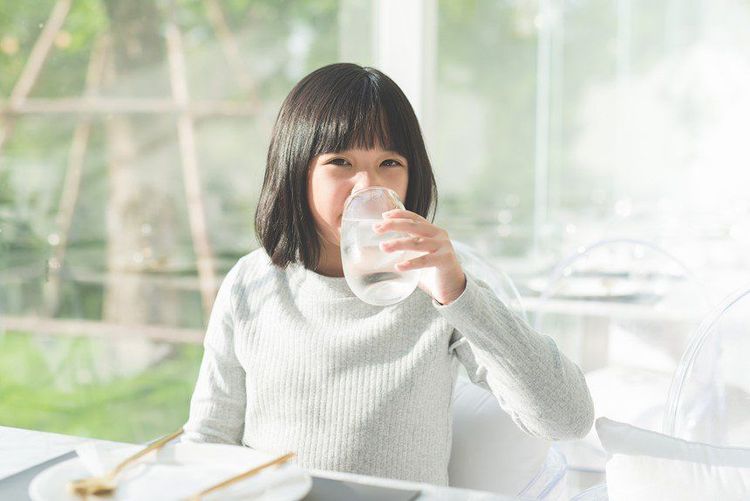
Cho bé uống nhiều nước để cải thiện tình trạng bệnh
In the process of taking care of a child with dengue fever, it is necessary to immediately take the child to a medical facility for timely examination and treatment by a doctor if it is found that the child has one of the following symptoms:
rushing, sluggish; Abdominal pain that is getting worse; Congestive skin but cold extremities; Sudden, persistent vomiting; Sudden gastrointestinal bleeding.
3. How to prevent dengue fever in children
Up to now, Vietnam still has no specific treatment and vaccine for dengue fever. Preventive measures being applied are to actively control insect vectors, such as killing larva (larvae), killing adult mosquitoes, avoiding mosquito bites, cleaning living environment, and eliminating water reservoirs. Please do the following to protect your baby's health and prevent dangerous dengue fever.
Parents can eliminate mosquito habitats and breeding grounds, kill larvae/larvae by:
Seal containers containing water, so mosquitoes cannot enter and lay eggs; Drop the fish into large capacity water containers (tanks, wells, jars, jars...) to let the fish eat all the larvae/larvae, if any. The fish to choose are guppies, squirrels, tilapia, carp, Argentinian pears,... Clean all small and medium-sized water containers (lu, khap...) weekly. ; Collect and dispose of items and scraps in and around the house, such as bottles, jars, broken bottles, broken jars, butter pipes, coconut shells, tires, old car covers, bamboo niches ,... Sanitize the living environment, turn the water containers upside down when not in use; Put salt or oil in a bowl of water for the bottom of the cupboard/cupboard, change the water in the vase/cotton vase. How to prevent mosquito bites for children:
Let children wear long-sleeved clothes; Sleeping in nets, using nets and pulling curtains (even during the day); Use mosquito repellent spray, anti-mosquito incense, mosquito repellant cream, mosquito-killing electric racket, ...
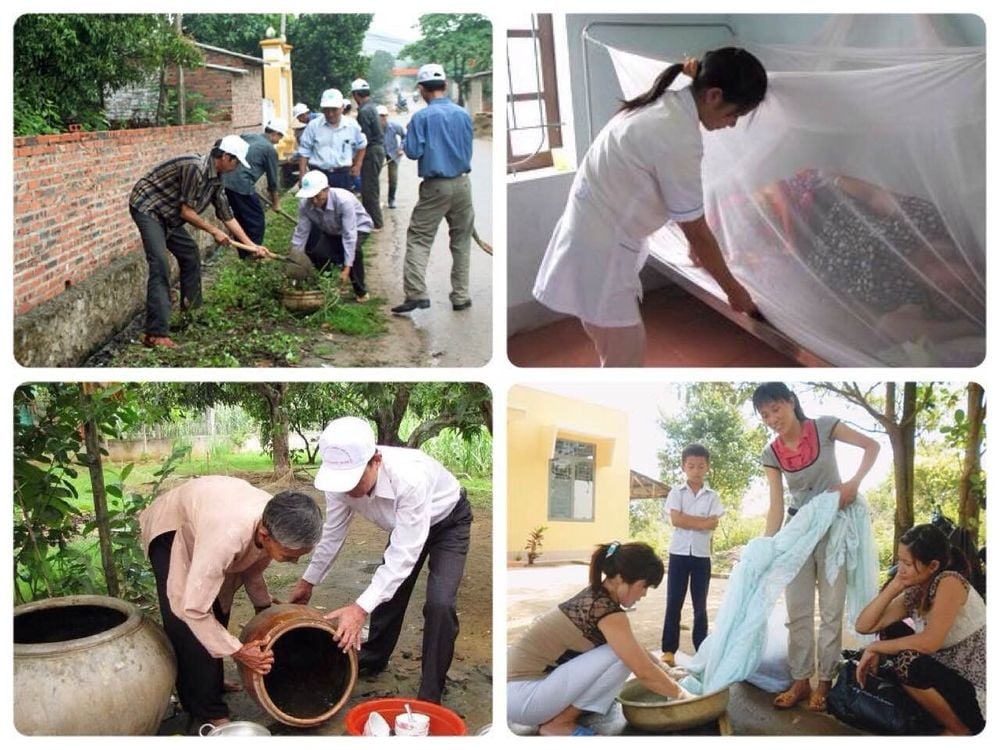
Phòng chống muỗi vằn là kim chỉ nam giúp giảm thiểu tỷ lệ bệnh nhi sốt xuất huyết
Besides, the family needs to actively coordinate with the authorities and the health sector in periodic spraying of chemicals to prevent dengue fever. The pediatric department at Vinmec International General Hospital is the address for receiving and examining diseases that infants and young children are susceptible to: viral fever, bacterial fever, otitis media, pneumonia in children ,....With modern equipment, sterile space, minimizing the impact as well as the risk of disease spread. Along with that is the dedication from the doctors with professional experience with pediatric patients, making the examination no longer a concern of the parents.
If you have a need for consultation and examination at Vinmec International General Hospitals under the nationwide health system, please book an appointment on the website for service.
Please dial HOTLINE for more information or register for an appointment HERE. Download MyVinmec app to make appointments faster and to manage your bookings easily.




